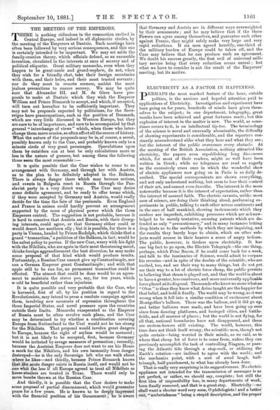THE MEETING OF THE EMPERORS.
THERE is nothing ridiculous in the commotion excited in Central Europe, and indeed in all diplomatic circles, by the meeting of the Emperors at Dantzic. Such meetings have often been followed by very serious consequences, and this one is certainly intended to be important. We may set aside the family-reunion theory, which officials defend, as an excusable invention, circulated in the interests at once of secrecy and of political etiquette. Great military monarchs, even when they happen to be great-uncle and grand-nephew, do not, when they wish for a friendly chat, take their foreign secretaries with them, and their heirs, and their most trusted servants ; nor do they meet in remote corners, amidst the most jealous precautions to ensure secrecy. We may be quite sure that Alexander III. and M. de Giers have pro- posals to make at Dantzic which they wish the Emperor William and Prince Bismarck to accept, and which, if accepted, will turn out hereafter to be sufficiently important. They may not be proposals expected by politicians, for the Sove- reigns have preoccupations, such as the position of Denmark, which are very little discussed in Western Europe, but they are sure to be of importance, and sure to be accompanied by that general " interchange of views " which, when those who inter- change them move armies, so often affect all the course of history. What the nature of the proposals may be is, of course, a secret, possibly known only to the Czar, and probably known only to a minute circle of very great personages. Speculations upon them by outsiders can at best be only calculations more or less in the nature of guesses, but among them the following three seem the most reasonable :- It is quite possible that the Czar wishes to come to an arrangement with Germany, and through her with Austria, as to the plan to be definitely adopted in the. Balkans. There is always danger there which may become serious, and events in Bulgaria react in Russia through • the Pan- slavist party in a very direct way. The Czar may desire some definite agreement, and be ready to offer terms which, if they were accepted by Germany and Austria, would really decide for the time the fate of the peninsula. Even England and France in unison could hardly prevent an arrangement supported by the mass of physical power which the three Emperors control. The suggestion is not probable, because it is hard to conceive that Austria and Russia, with their diverg- ing interests, could agree, or that Germany either could or would desert her southern ally ; hut it is possible, for there is a party in Vienna, headed by Prince Rudolph, which thinks that a grand "transaction," a partition of the Balkans, in fact, would ba the safest policy to pursue. If the new Czar, weary with his fight with the Nihilists, who are again in their most threatening mood, thinks foreign aggrandisement the best diversion, he may make some proposal of that kind which would produce results. Fortunately, a Russian Czar cannot give up Constantinople, nor can a German Emperor grant Constantinople ; and with that apple still to be run for, no permanent transaction could be effected. The utmost that could be done would be an agree- ment to maintain the status quo, say, for ten years, which w mild be beneficial rather than injurious.
It is quite possible and very probable that the Czar, who is harassed, first of all, by his position in regard to the Revolutionists, may intend to press a resolute campaign against them, involving new measures of repression throughout the three Imperial States, and novel pressure upon the countries outside their limits. Monarchs exasperated as the Emperor of Russia must be often revolve such plans, and the Czar may be determined to try whether a combination covering Europe from Switzerland to the Ural would not be too strong for the Nihilists. That proposal would involve great dangers to Europe, because the right of asylum would be menaced ; but it is not likely to be accepted, first, because Germany would be irritated by savage measures of precaution; secondly, because the Austrian Emperor does not want to see his House a mark for the Nihilists, and his own immunity from danger destroyed—he is the only Sovereign left who can walk about ;where he likes—and thirdly, because Prince Bismarck knows that,the acute danger exists in Russia itself, and would not be one whit the less if all Europe agreed to treat all Nihilists as horse-stealers are treated in Texas. There would only be more bombs thrown at the Russian Czar.
And thirdly, it is possible that the Czar desires to make some proposal of partial disarmament, which would guarantee peace for a few years. He is known to be deeply impressed with the financial position of his Government ; he is aware that Germany and Austria are in different ways overweighted by their armaments ; and he may believe that if the three Powers can agree among themselves, and guarantee each other against France, they might safely make very large and very rapid reductions. If six men agreed heartily, one-third of the military burden of Europe could be taken off, and the Czar may believe that he can produce such an agreement. We doubt his success greatly, the first evil of universal mili- tary service being that every reduction seems unreal ; but what we have to consider is not the result of the Emperors' meeting, but its motive.






























 Previous page
Previous page